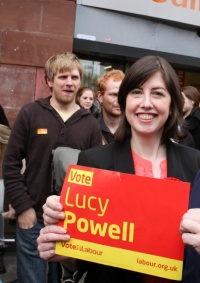Difference between revisions of "Lucy Powell"
m (edit & heading style sentence case not title case/ further edits/typo) |
|||
| Line 12: | Line 12: | ||
After this, she went politics and in 1997 caught [[Ed Miliband]], the Labour party leader's attention while working at Labour’s Millbank headquarters on the UK general election campaign. <ref> ref needed here </ref> | After this, she went politics and in 1997 caught [[Ed Miliband]], the Labour party leader's attention while working at Labour’s Millbank headquarters on the UK general election campaign. <ref> ref needed here </ref> | ||
| − | == | + | ==Labour election strategy against UKIP: don't talk about immigration== |
In December 2014 Powell approved a controversial document advising Labour MPs not to engage with voters on the subject of immigration. The leaked document was a 33-page paper entitled ‘Campaigning against Ukip’ which advised Labour candidates to focus on 'moving the conversation on' from immigration if it was raised. <ref> [http://www.theweek.co.uk/politics/61810/lucy-powell-in-doghouse-over-toxic-labour-immigration-memo Lucy Powell in doghouse over toxic Labour immigration memo] ''The Week'', accessed 2 March 2015 </ref> | In December 2014 Powell approved a controversial document advising Labour MPs not to engage with voters on the subject of immigration. The leaked document was a 33-page paper entitled ‘Campaigning against Ukip’ which advised Labour candidates to focus on 'moving the conversation on' from immigration if it was raised. <ref> [http://www.theweek.co.uk/politics/61810/lucy-powell-in-doghouse-over-toxic-labour-immigration-memo Lucy Powell in doghouse over toxic Labour immigration memo] ''The Week'', accessed 2 March 2015 </ref> | ||
Revision as of 04:31, 17 September 2015
Lucy Powell is the UK Labour Party MP for Manchester Central. [1]
Powell was elected in a by-election on 15 November 2012 and is the first female Labour MP to represent a Manchester constituency. [2] In the 2015 general election Powell retained her seat with a majority of 21,639. [3]
She is also the shadow minister for the Cabinet Office and was vice chair of Labour's general election campaign. [4] As of September 2015, Powell now serves as the shadow minister for education following leader Jeremy Corbyn's extensive reshuffle. [5]
Contents
Background
Before going into politics, Powell led a major investment project in Manchester for NESTA, the UK’s innovation agency. As leader of this project, she worked with local businesses and other partners to support start-ups and creative companies in and around the region.
After this, she went politics and in 1997 caught Ed Miliband, the Labour party leader's attention while working at Labour’s Millbank headquarters on the UK general election campaign. [6]
Labour election strategy against UKIP: don't talk about immigration
In December 2014 Powell approved a controversial document advising Labour MPs not to engage with voters on the subject of immigration. The leaked document was a 33-page paper entitled ‘Campaigning against Ukip’ which advised Labour candidates to focus on 'moving the conversation on' from immigration if it was raised. [7]
Her approval of this document brought Powell significant scrutiny from fellow Labour Party members, with some frontbenchers said to be 'incandescent; with rage. Many party members believed it 'threatened to undermine Ed Miliband's attempts to claim Labour was getting tough on immigration'. [8]
Education
Powell studied chemistry at University of Oxford and King’s College London. [2]
Notes
- ↑ Lucy Powell MP www.parliament.uk, accessed 2 March 2015
- ↑ 2.0 2.1 About Lucy Lucy Powell MP, accessed 2 March 2015
- ↑ Manchester Central - Labour Hold for Lucy Powell, the party's election supremo ITV News, 8 May 2015, accessed 18 May 2015
- ↑ Lucy Powell NewStatesman, accessed 2 March 2015
- ↑ ref needed here
- ↑ ref needed here
- ↑ Lucy Powell in doghouse over toxic Labour immigration memo The Week, accessed 2 March 2015
- ↑ Ben Riley-Smith Ed Miliband's new election chief under fire over 'cack-handed' leaked strategy document The Telegraph, 15 December 2014, accessed 2 March 2015
